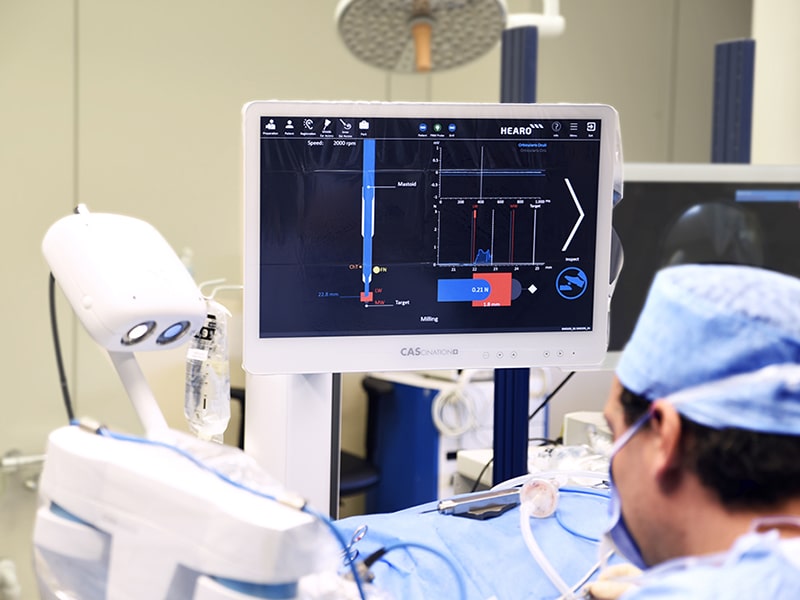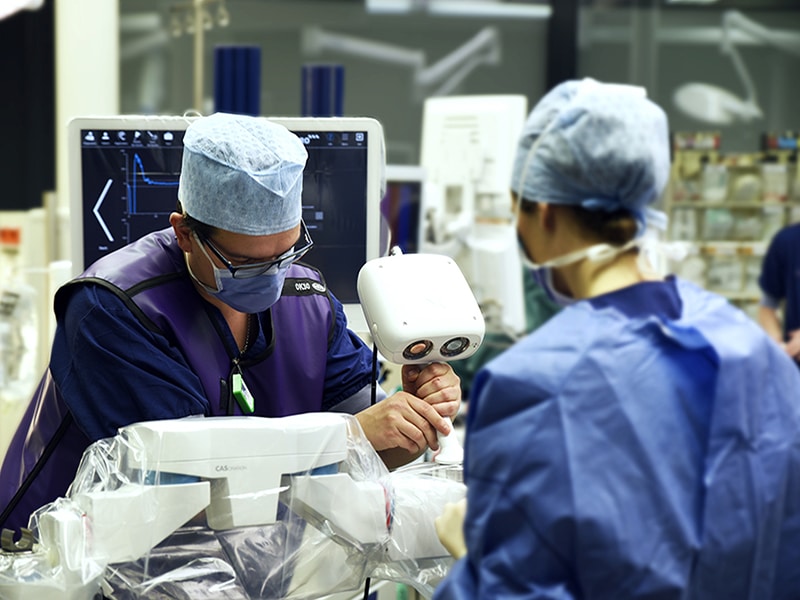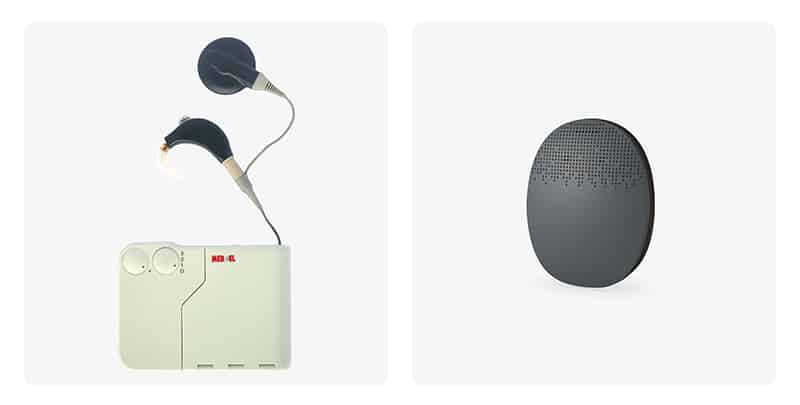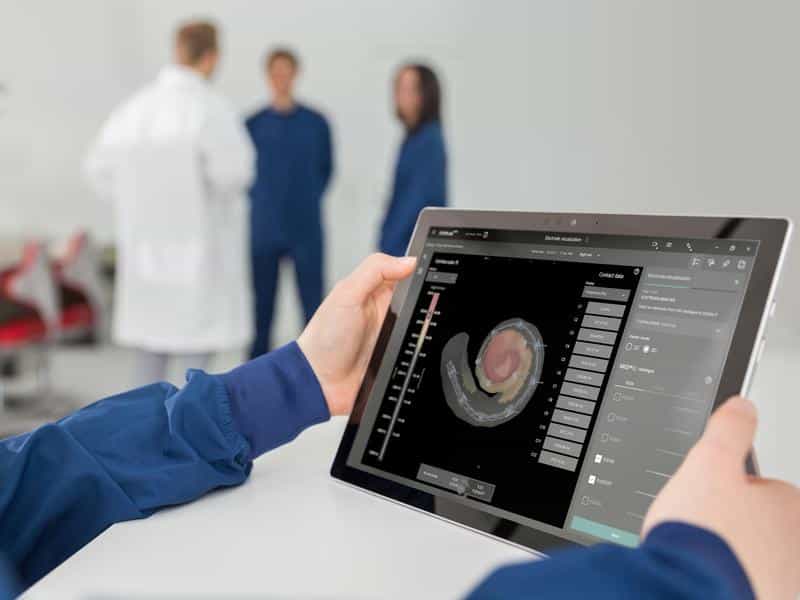
MED-EL
Published Aug 02, 2023
The Future of Cochlear Implants
Ever wondered what cochlear implants will be like one, five, or even 10 years from now? From invisible cochlear implants to robot-powered surgery, we look at what the future of cochlear implants holds.

It’s been almost half a century since the first modern cochlear implant was implanted. Pioneered by MED-EL founders Ingeborg and Erwin Hochmair, it helped restore a sense of sound and speech to profoundly deaf users.
Since then, cochlear implants have developed in leaps and bounds. Improved sound technology helps people understand speech in tricky situations and enjoy music. Audio processors can stream sound from your phone, charge without wires, and they come in various designs to suit your lifestyle.
Still, the push to develop cochlear implant technology isn’t over. Far from it: Our research and development teams are always striving to make hearing solutions even more effective. Let’s take a look at what the future of cochlear implants could bring.
Totally Implantable Cochlear Implants
At the moment, cochlear implants consist of two parts: the internal implant and the external audio processor. Imagine if you didn’t need the outside part at all. That’s the idea behind the totally implantable cochlear implant.
The whole system—including the audio processor, microphone, and power supply—would all sit under the skin. This would effectively make the system invisible and work even when the user is asleep.
But how far away are we from a totally implantable cochlear implant? Well, the first one was implanted in Europe in 2020 as part of a clinical study. As with any new medical device, ensuring its long-term reliability and safety is of utmost importance. This makes it tricky to give an exact timeline on when the totally implantable cochlear implant will be widely available, but it will take several years before it receives market approval.
Robotic Cochlear Implant Surgery
Inner ear surgery needs incredible precision. This makes it the perfect candidate for robotic surgical systems such as HEARO, pioneered by MED-EL and CASCINATION AG. Using this autonomous technology, ear surgeons can perform cochlear implant operations with absolute precision and minimal invasion. This helps further preserve any remaining hearing . Of course, MED-EL’s super flexible electrodes already help preserve residual hearing—but HEARO could take this aspect to new levels.

So will your cochlear implant surgery be performed by a robot? To date, there have only been a few autonomous robotic cochlear implant surgeries as this technology is being rolled out. Most cochlear implantations are still being carried out purely by (human) surgeons.
The Rise of Telemedicine and Remote Rehabilitation
The COVID-19 pandemic forced every sector to embrace remote options, including hearing healthcare. But the benefits go beyond the pandemic, especially for people living in rural areas.
Cochlear implant rehabilitation is one area with huge potential. More and more rehab professionals use telepractice, including remote rehabilitation lesson kits. We’ve also seen a rise in apps that can support listening training. Take a look at Meludia, which offers music training in multiple languages.
There’s also the potential for audiological check-ups and fittings to be carried out remotely. This will save time and money for health services and cochlear implant users alike.
Ever-Improving Audio Processors
In the early days of cochlear implants, processors were about the size of a large wallet and had to be worn on the body. Today, audio processors are smaller than an AA battery and worn on the head. They can automatically adapt to different sound environments for superior hearing performance. And they can connect with phones and TVs for easy streaming.

The body-worn Comfort CI speech processor versus the single-unit RONDO 3 audio processor
Future cochlear implant audio processors are set to build on these improvements still. Since we design new audio processors to work with older implants, current CI users will also be able to enjoy these new technologies.
(Even) Better Sound Quality and More Individualized Solutions
In just 50 years, we’ve gone from implants that can support speech understanding to ones that can support a whole spectrum of sound. And new technologies and the right electrodes can make sound experiences with cochlear implants even more natural.
Take OTOPLAN, for instance. This surgical planning software lets surgeons select the right electrode for each cochlea. And after implantation, the audiologist can program the audio processor to match a person’s individual anatomy. This can help cochlear implant users come closer to natural hearing.

OTOPLAN helps surgeons select the right electrode
As more technologies like this emerge, we can expect to see even more individualized approaches to cochlear implants. In fact, one of MED-EL’s goals is to further customize future cochlear implants for the best possible results.
“Our next goal is to further customize treatment with CI for people of all ages in order to achieve the best possible result in accordance with the principles of precision medicine.”
Dr. Ingeborg Hochmair
MED-EL's CEO and pioneer of the modern cochlear implant
Should I Wait for Future Cochlear Implant Technology?
With all these future cochlear implant developments, it might be tempting to put off your cochlear implant surgery. But hearing professionals agree that it’s best to get your cochlear implant as early as possible. Why? Because early cochlear implantation results in better outcomes and brain function. This is true for both adults and children.
MED-EL cochlear implants are also designed with future technology in mind. Our flexible electrodes help keep the delicate structures in the inner ear safe. This preserves residual hearing, so you can take advantage of new technologies when they become available.
And when we bring out new audio processors, we make sure that they also work with older implant generations. This will let you enjoy future audio processor technology without more surgery.
Hear About Future Developments First
Sign up for our news and updates newsletter and be the first to hear about the latest developments in cochlear implants and hearing solutions.
Get Free UpdatesReferences

MED-EL
Was this article helpful?
Thanks for your feedback.
Sign up for newsletter below for more.
Thanks for your feedback.
Please leave your message below.
Thanks for your message. We will reply as soon as possible.
Send us a message
Field is required
John Doe
Field is required
name@mail.com
Field is required
What do you think?
© MED-EL Medical Electronics. All rights reserved. The content on this website is for general informational purposes only and should not be taken as medical advice. Contact your doctor or hearing specialist to learn what type of hearing solution suits your specific needs. Not all products, features, or indications are approved in all countries.
Marek
August 05, 2023
Konkretna nauka która przekłada się dla dobra osób chorych oby tak dalej
michael moore
August 10, 2023
Can we get any feedback from the internal implant that was done in 2020? I have an implant on my right side and do exceptionally well with it. I would like a second but if it's possible to anticipate the internal implant in the not to distant future, it seems worth the wait. Thanks,
MED-EL
August 11, 2023
Michael, thank you for your question. We are unable to discuss future developments, but we are always working to provide the best hearing solutions for our recipients. MED-EL cochlear implants are designed with future technology in mind so that when new audio processors are brought out, they can also work with older implant generations. Kind regards, Alicia
Arslan malik
August 29, 2023
Hye dear i hope you will be fine can you share cochlear implant price .
MED-EL
August 29, 2023
Arslan, thank you for your comment. We recommend contacting your local MED-EL team for product availability and pricing information, as they have the latest information for your country. You can find their contact details here: https://www.medel.com/clinic-finder/ Kind regards, Alicia
David C. Parker
October 13, 2023
I have Meniere's disease and am expecting to need to get a cochlear implant on my left side in the not-too-distant future. I would like to know if I get a MED-EL implant of the current state of the art could that device be replaced with a completely implanted device in the future (same side) as the one that I might add soon? I think the fully implanted version could be a paradigm shift in this technology - many that are in need I believe are hesitant to move forward due to the exterior components of the mechanism itself. Thank you. David Parker
MED-EL
October 16, 2023
Hi David, thanks for reaching out. We recommend contacting your local MED-EL team via https://www.medel.com/clinic-finder as they are best equipped to help you with your question. Kind regards, Gordana
Neal Steiger
November 05, 2023
Got an oops message when I tried to sign up for email announcements about future CI development.
MED-EL
November 06, 2023
Hello Neal, thank you for your interest. Please accept the cookies first and then try to sign up again. Thank you for your understanding. Kind Regards, Giulia
Barbara Zimmer
November 24, 2023
Does the new technology Auracast have any benefits for cochlear implant people beyond just the ability for more people to connect to the television at the same?
MED-EL
November 27, 2023
Hi Barbara, thank you for your question. Auracast does offer benefits for cochlear implant users, by enhancing connectivity with a wide range of potentially compatible audio sources, including smartphones, tablets, and other Bluetooth-enabled devices. The technology is designed to deliver clear and crisp audio directly to your audio processor with minimal interference, ensuring a more immersive and enjoyable listening experience. Kind Regards, Giulia
Erin Phillips
January 22, 2024
When will this be available. I have a MedEL on the right side and it's been horrible.
MED-EL
January 23, 2024
Erin, thank you for your comment. Unfortunately, we are unable to share more information regarding future developments. However, we can recommend getting in contact with your local MED-EL team so that they may assist with what you are experiencing on your right side. You can find your local MED-EL team's contact details here: https://www.medel.com/clinic-finder/ Kind Regards
Olivier Merz
April 10, 2024
Hi, I've also been reading about Auracast technology and I deeply wait from Medel to integrate it ! So it allows bistreaming with any futur hearing aid (for people that have a cochlear implant and a hearing aid). It'll facilite daily life by no longer need to search, try and justify the financement of intermediate devices (like Artone 3 max or Phonak microphone and receivers) in front of assurances.
MED-EL
April 11, 2024
Thanks for your feedback, Olivier! We have forwarded it to our local experts for future product improvements. Kind regards, Gordana
Karen Ricard
April 18, 2024
Hi I got my kenso implant in 2018 and I am waiting and hoping for the implantation if I spell it correctly where my implant will be invisible..that would be a dream come true for me!! How can I be the candidate when it is ready to be use?
MED-EL
April 19, 2024
Hi Karen, thanks for reaching out. Our Totally Implantable Cochlear Implant (TICI) is currently still in a feasibility study: https://www.medel.com/press-room/press-details/2020/10/19/first-surgeries-ever-in-europe-with-a-totally-implantable-cochlear-implant If you're looking for further information on this, we recommend getting in touch with your local MED-EL team via https://www.medel.com/contact-med-el Kind regards, Gordana
Margaret Haines
May 16, 2024
I attempted to sign up for your updates, but was told this was not successful for an "unexpected error". Perhaps because I have already signed up for everything? Or because the Italian Med-el company is understaffed and restricted by local legislation?
MED-EL
May 17, 2024
Hi Margaret, thanks for your comment. We recommend accepting the cookies on our page before signing up for our newsletter. Would you please try again and let us know if it worked? Kind regards, Gordana
Shelly Dulka
November 07, 2024
I received my cochlear 2021. Worse mistake I have ever made. With a or without improvements cochlear doesn't’ work for everyone. Do your homework in deep before for making this move. It’s a glorified hearing aide
MED-EL
November 08, 2024
Hi Shelly, thank you for reaching out and for sharing your feedback with us. If you're not satisfied with your hearing performance with a CI, we recommend getting in touch with one of our local experts who will gladly assist you on your hearing journey. You can reach out to them directly here: https://www.medel.com/contact-med-el. Kind regards
Bob
November 14, 2024
Do you expect to pair with a hearing aid in the near future
MED-EL
November 14, 2024
Hi Bob, thank you for reaching out. We cannot talk about future developments at this point, but rest assured that all our latest news and updates will be shared on all our social media channels as well as our website, so stay tuned! Kind regards
Robert
January 29, 2025
My name is Robert and I have a bilateral hearing loss. I wear hearing aide on both ears and lately the right ear now is completely deaf. If I were to have cochlear implant will this possibly give me sound in the right ear as I stated completely deaf
MED-EL
January 29, 2025
Robert, thank you for reaching out. We recommend getting in touch with your local MED-EL team, as they can take a direct look at your case and provide you with the best information: https://www.medel.com/contact-med-el You may also be interested in reading Mary Beth's story. She received her first CI in 2015 but hadn't heard from her right ear in 24 years before this. You can read more about her experience here: https://blog.medel.com/userstories/bilateral-cochlear-implants-mary-beths-story/ Kind Regards
Bob Heddle
February 25, 2025
I had severe hearing loss, and had an implant on the left in 2020. It was good , but not helpful when listening for birds, or for locating the direction of a sound 3 years later I asked for an implant on the right. Transformational for me . I can even appreciate music, and bird song is again a pleasure Speech is a bit more difficult, but good in an open environment. In a group of people who are all talking it’s not so good On balance, No Regrets, the devices restored my life. I’m 83
Lina
February 25, 2025
When will a Rondo be available that has direct Bluetooth to iphone & Carplay (without needing to use other intermediary devices)?
MED-EL
February 26, 2025
Hi Lina, thank you for your question. For direct wireless streaming we recommend using our AudioStream Adapter with RONDO 3: https://www.medel.com/hearing-solutions/accessories/connectivity/audiostream-adapter Kind regards, Gordana

MED-EL

MED-EL



Conversation
16 Comments